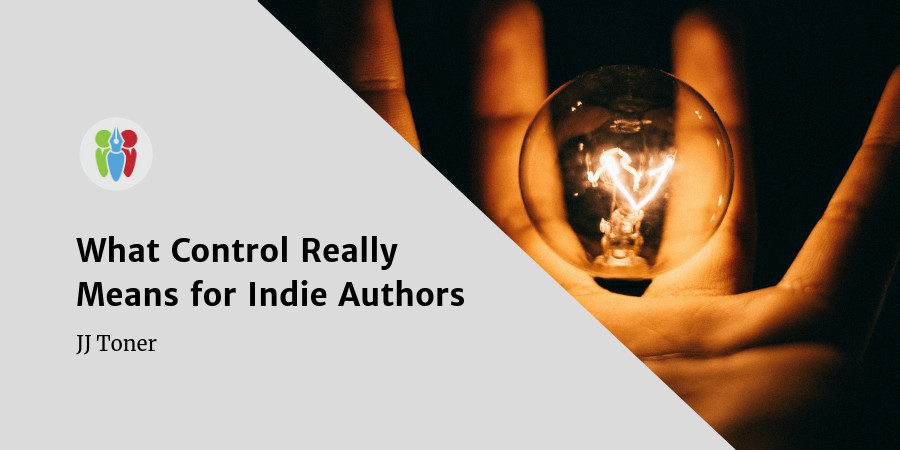For an indie author, maintaining control over our work is often one of the reasons we choose to be and stay independent. We want control of our covers, our plots, our characters. And why not, it's our business. Author member JJ Toner explores what control really means for indie authors.
What Control Really Means for Indie Authors

Irish indie author JJ Toner examines different ways a writer needs to stay in control of their manuscript
When you board a plane, you place yourself in the hands of the pilot. For the duration of the flight, you place your absolute trust in the pilot, handing over control. It’s the same with books. You are the pilot of your book, and it’s essential that the reader feels she is in safe hands from page one right through to the end of your book.
Whatever you write, whether it’s a thriller, a romance, even a memoir, you must maintain control. From the moment they start a book, a reader must feel that the author knows what she's doing, that the story will develop sensibly, that it won’t veer wildly off the rails somewhere. Starting a book is like setting out on a flight, or a journey into a dense forest with the author as guide. The reader must trust the author’s ability to get her through the experience. In a word, she needs to feel that she’s in good hands, that the author knows where she’s going and what she’s doing, that she has total control.
If you lose control, the reader will know, she will feel it and she’s unlikely to enjoy your book. She is highly likely to stop reading it.
So what exactly does maintaining control of your book mean?
Control is just as important for non-fiction as it is for fiction, but what follows relates mainly to fiction.
The Story
First, you need to keep a tight grip on the storyline. Cause and effect is what drives a tight story. Your main character’s actions must make sense at every step. When something happens to her, she must react in a logical way. Maybe this reaction gets her into more trouble and so, she must react in a logical way again.
There must be a solid reason for everything that happens in your story. If the villain causes the hero problems, then the villain’s motivations must be clear and logical. And there can't be a lucky accident that finally gets the protagonist out of trouble.
Your character’s motivations may be hidden as an element of the storyline. That’s fine, just so long as everything is explained and it all makes complete sense by the end of the book.
Avoid coincidences; they undermine the credibility essential to a good story.
Point of View
A good writer will keep control of ‘point of view' at all times. Hopping between the heads of characters is a sure sign the writer isn't in control of the narrative. Switching point of view is fine, but do it in a controlled fashion, with a change of chapter or section within a chapter. However it’s done, the writer must maintain control. The reader will appreciate it, there’s nothing worse than head hopping. ‘Omniscient’ point of view is no excuse for head hopping. The omniscient narrative has its own in-built control, and involves careful use of internal dialogue.
Plot
The plot is the way you choose to present the story, the timeline, the points of view, etc. Again, the writer must keep tight control. If the plot flip flops back and forth through time using flashbacks, you'll need to keep a tight control of your tenses, and be careful not to confuse the reader. The past perfect tense is often used to fill in missing parts of a story, as in this example:
We arrived at the FBI headquarters in good time. John came armed with nothing more lethal than a thermos flask of coffee. He had contacted Special Agent Bryson the night before and had filled him in on the results of our investigation so far. Bryson had insisted on a face to face meeting and John had asked me to accompany him. I had been happy to oblige; I hadn’t seen the inside of the Langley building since I had been escorted out in the eighties.
This passage uses the past perfect to fill in a small detail. It lacks control, however by overuse of the word ‘had’. In passages like this it is advisable to eliminate as many of these as possible, like this, perhaps:
We arrived at the FBI headquarters in good time. John came armed with nothing more lethal than a thermos flask of coffee. He had contacted Special Agent Bryson the night before and filled him in on the results of our investigation so far. Bryson insisted on a face to face meeting and John asked me to accompany him. I was happy to oblige; I hadn’t seen the inside of the Langley building since I was escorted out in the eighties.
Exposition
This is the insertion into the narrative of background information. It could be anything from a description of a scene, or an explanation of context, to a snippet from a character’s past life. This is one area of control which is vital. Sometimes these are unavoidable, but they must be used sparingly and with great care. Too many expository passages will break the flow of the story and risk boring the reader. Ask yourself what’s the least amount of exposition you need to get the basic information across. Then see if you can impart some or all of it through dialogue.
Dialogue
Dialogue needs to be short. It's so easy to lose control of our characters when they start to speak. I try to apply the ‘Hollywood Test’ to every line of dialogue. Ask yourself: “If this was a film script would this line of dialogue make it onto the screen?”
Conflict
Every scene in your story must include an element of conflict. Yes, that’s every single scene – no exceptions. A scene may have a small conflict, a character’s internal debate, maybe, or a battle against the elements, but don't include scenes unless they have some conflict. Think Hollywood again. Look at each scene in your book and ask yourself if it would make it through the cutting room and onto the screen. You must keep driving your story forward; there can't be any waste or pointless, boring scenes. Control the story.
Voice
The one thing that distinguishes a book from any other is the voice of the narrator. In some books, voice is everything, dominating the narrative and carrying the reader through the pages like a force of nature; in others it may be more subdued, more subtle, but it’s still there, nonetheless. Voice is a key way the writer controls the narrative.
Pacing
Again, control here is vital. A thriller, for example, may involve strong action scenes. But not every scene can be action-packed. There must be quiet scenes (involving conflict) in between, and these are where the writer must exercise her greatest control over the story.
Reader Expectations
Whatever type of book you write, you'll raise expectations in your readers’ minds. You'll cause them to ask questions about the story and about the characters and have expectations about the possible outcomes. Who killed the pastor’s wife? Will the main character find happiness? Will Johnny survive the war in one piece or will he be scarred by his experiences? Will the villain realize the evil he’s done and come to a sticky end? These are expectations you create in the reader’s mind, and they must all be satisfied, all of the questions answered and loose ends tied up. Fail to do this satisfactorily and your reader will react badly. She may write a bad review or avoid any other books you write; she certainly won’t recommend your work to her friends.
Tone
The tone of the book frames the reader’s expectations and you must keep it under control throughout. Is this a light, fun read or something deeper, darker, like a ghost story, a thriller or a fantasy? Violent changes of tone will jolt the reader and risk the worst of all outcomes – a discarded book. Imagine reading a romcom where, right in the middle of all the hilarity, one of the characters overdoses on sleeping pills and commits suicide! The tone of your book is established from the first page. Stick to it and keep control.
The Details
The writer must control every detail. The timeline must make sense. Keep control of who knows what at each stage, never mistake one character for another or mis-spell a character’s name. Choose the names of your characters with care. Alison and Alicia, for example, are too similar, as are Bennett and Benedict, Johnson and Thomson.
Control the Flow
Remember your readers may be distracted while reading your book. Never assume they are as in tune with your story and your characters as you are. Look for subtle ways to remind them of the important plot points and characters as you move into each new chapter. A carefully chosen word or phrase may be all that’s needed. You don’t want your reader to have to go backwards to find out what's happening or who a character is. But don’t overdo it. Take this example from the start of a chapter 12:
Lucy took a long bath in the hopes of scrubbing the whole miserable episode from her mind.
You’ve got to assume that there’s been a hiatus in the reader’s life since she put the book down after reading chapter 11 (or any chapter). She may have married, had a child, and moved house three times in the meantime! Or it may be that the ‘miserable episode’ is something that happened in chapter 6.
Be careful to keep your important characters in the reader’s mind. In a mystery, there’s nothing worse than when the guilty party turns out, in chapter 81, to be someone that hasn’t been mentioned since chapter 3 – or at all since the start of the book.
Summary
So there you have it. You are the pilot of your book, readers are your passengers. Keep control over every aspect of your book’s journey, give your readers a smooth, satisfying ride and they will come back for more.
What Control Really Means for Indie Authors from @jjtoner_ya #indieauthor #selfpublishing #IARTG #ASMRG #writingcommunity Share on X
OVER TO YOU
How much control do you like to keep over your story? What aspects of plot or character do you think are most important to control?
If you enjoyed this post, you'll love these from the ALLi archive:





Extremely good post, with some very good points made. Like the conflict in each scene, even if no action or however small.
Great post, JJ. I especially like your Hollywood tests – will bear those in mind in future when self-editing.